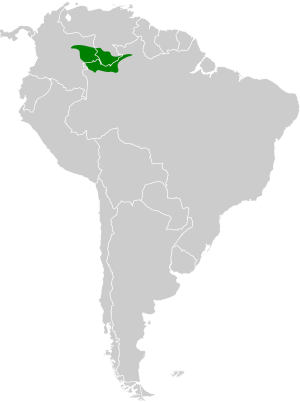Rio Negro gnatcatcher facts for kids
Quick facts for kids Rio Negro gnatcatcher |
|
|---|---|
| Scientific classification |
|
| Kingdom: | Animalia |
| Phylum: | Chordata |
| Class: | Aves |
| Order: | Passeriformes |
| Family: | Polioptilidae |
| Genus: | Polioptila |
| Species: |
P. facilis
|
| Binomial name | |
| Polioptila facilis Zimmer, J.T., 1942
|
|
 |
|
| Script error: The function "autoWithCaption" does not exist. | |
Script error: No such module "Check for conflicting parameters".
The Rio Negro gnatcatcher (Polioptila facilis) is a small, active bird that lives in the forests of Brazil. It's part of the gnatcatcher family, known for their quick movements and insect-eating habits. This bird is special because it's only found in a specific part of the world, near the famous Rio Negro river.
Contents
About the Rio Negro Gnatcatcher
The Rio Negro gnatcatcher is a unique type of bird. For a long time, scientists thought it was just a different kind of Guianan gnatcatcher. But since 2019, they've realized it's its own separate species. This decision was made because the Rio Negro gnatcatcher looks and sounds quite different from the Guianan gnatcatcher.
What Does It Look Like?
This little bird is about 10 to 11 centimeters (4 to 4.3 inches) long. That's about the length of a small smartphone! It weighs only 6 to 7 grams (about 0.2 ounces), which is lighter than a single coin.
Male Rio Negro gnatcatchers have a bluish-gray head, chest, and back. Their belly is white, and the colors blend together smoothly. Their tail feathers are black on the inside and white on the outside, with shades of gray in between. Female gnatcatchers look similar but have slightly lighter colors.
Where Does It Live?
The Rio Negro gnatcatcher lives in the northern part of the Amazonas state in Brazil. You can also find it in small areas of southern Venezuela and eastern Colombia, right next to Brazil. A big part of where it lives is near the Rio Negro, which is a "blackwater" river. This means its water looks dark, like tea, because of plants breaking down.
These birds like to live in humid, untouched forests. They usually stay near the edges of the forest or high up in the treetops. They prefer areas that are mostly below 500 meters (1,600 feet) in elevation.
Behavior and Habits
What Does It Eat?
Scientists don't know a lot about what the Rio Negro gnatcatcher eats. But like other gnatcatchers, they probably mostly eat arthropods. Arthropods are small creatures like insects and spiders. These birds are very active when they look for food. They often join groups of different bird species that are foraging together. This way, they can find more food and stay safer.
Reproduction
Not much is known about how the Rio Negro gnatcatcher reproduces or builds its nests. Scientists are still studying this part of their life.
What Does It Sound Like?
The song of the Rio Negro gnatcatcher is made up of high-pitched notes that are repeated over and over. You can sometimes hear them calling from the forest canopy. Listen to its song here!
Conservation Status
The IUCN (International Union for Conservation of Nature) is an organization that checks on how endangered different species are. They haven't officially checked the Rio Negro gnatcatcher yet. However, the areas where this bird lives are not currently thought to be in serious danger. This is good news for the gnatcatcher!
See also
In Spanish: Perlita del río Negro para niños
 | Janet Taylor Pickett |
 | Synthia Saint James |
 | Howardena Pindell |
 | Faith Ringgold |

